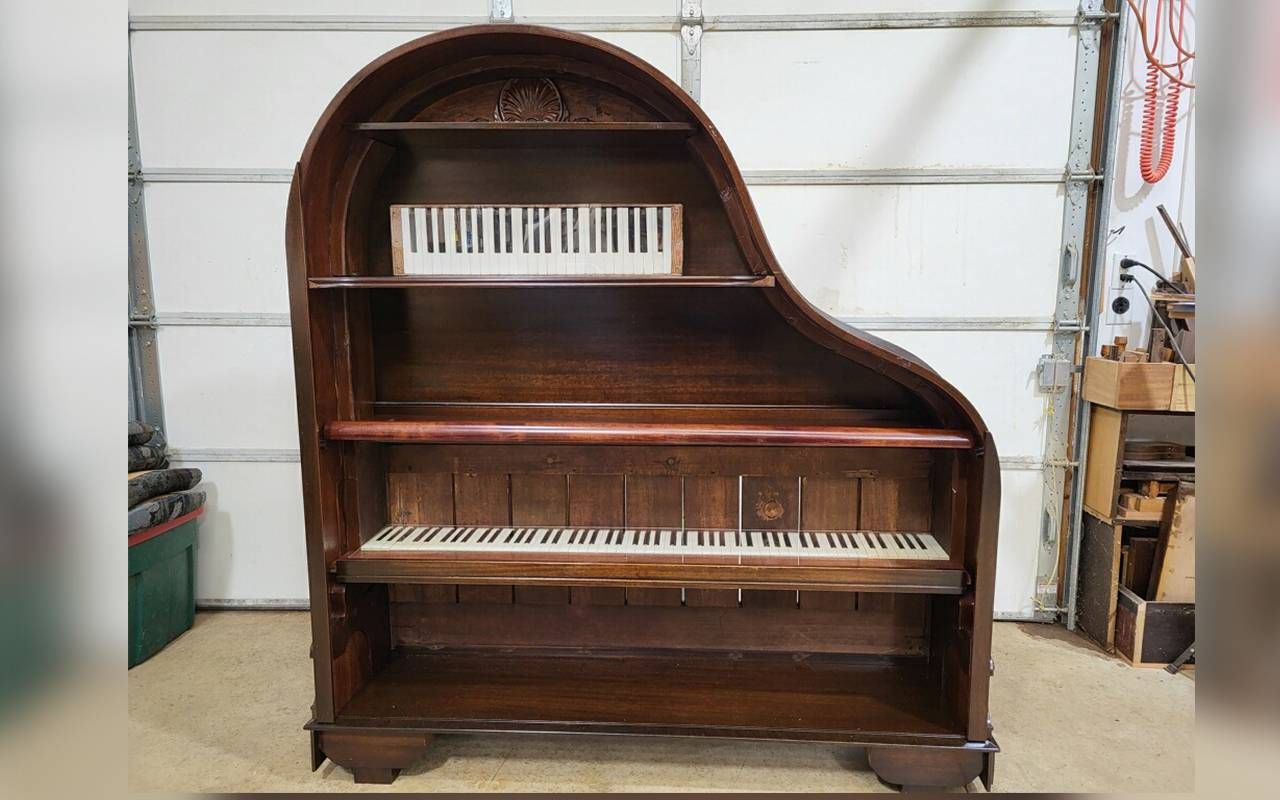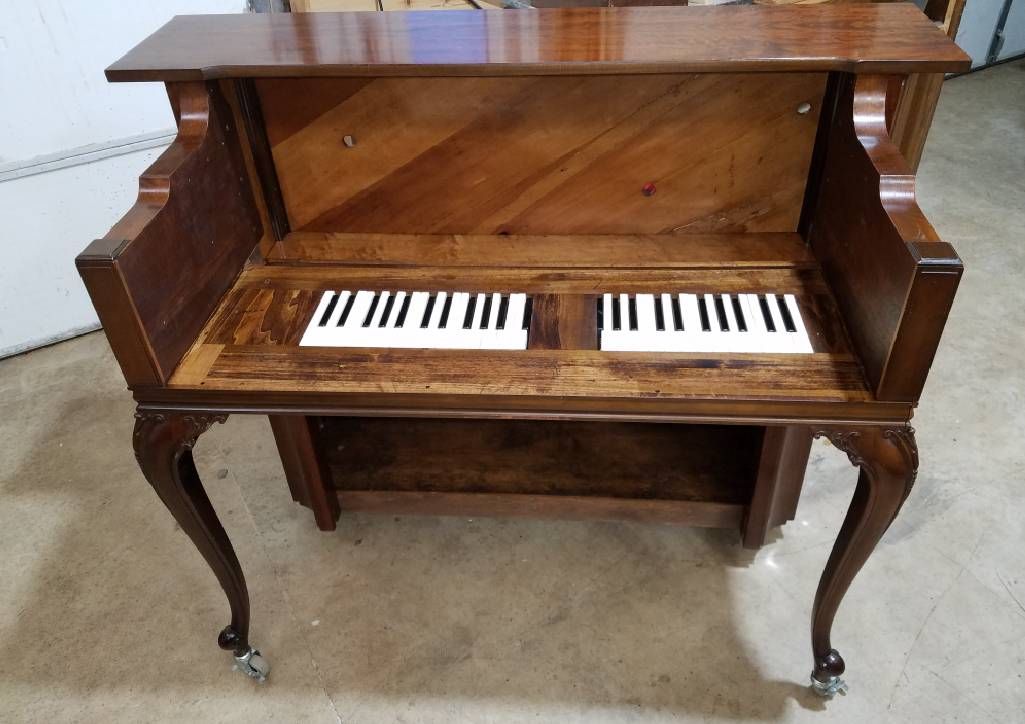When a Piano Is No Longer Grand
Used — and often unusable — pianos are cluttering living rooms across America, but they are harder to give away than you might think
Old pianos are often the metaphorical elephant in the room: they're big, heavy (some grand pianos can weigh as much as 1,200 pounds) and no one is keen to discuss an exit strategy.

Downsizing, or moving to smaller quarters after your children have left home, makes it even more pressing to decide what to do with one. These days, pianos no longer offer social status or inspire spontaneous family singsongs. Instead, they're more likely to be dismissed as "brown furniture" older people seem to have.
Most people go back and forth on what to do with a piano because it's such an emotional decision often tinged with guilt, sadness or a genuine attachment.
Certainly, it's a hard sell to get one's children to adopt an heirloom piano, even if they pretend to consider it.
12,000 Pianos a Year
In fact, finding a new home for an old piano can be a real chore. Well-meaning friends frequently claim that a church, school or community center would be "thrilled" to have a piano gifted to them. But sadly, they probably won't.
The United States alone disposes of 12,000 pianos every year, and this figure may be a conservative estimate.
Most people go back and forth on what to do with a piano because it's such an emotional decision often tinged with guilt, sadness or a genuine attachment. No one wants to think about next steps.
Alternatives to the Dump
The piano may have been neglected for years and family members may have been taking turns reluctantly housing them as circumstances change. Making a final decision can feel desperate and overwhelming.
But before opting for the quickest solution — paying someone a tidy sum to haul the piano to the dump, possibly chopping it up first — there are other choices that may surprise you.
Matt Hirschfelder, the owner and lead technician at NorthWest Piano service in Salem, Oregon, has practical advice about where to begin.
"I always suggest that people should educate themselves first, find out what they're dealing with," he said in a recent telephone chat. "Checking to see if there is a member of the Piano Technicians Guild available in your area is a great first step."
Consulting with an expert can be especially reassuring for those who are just exploring their options and it's vital to know what can reasonably be expected.
Some Are Savable
Professional tuning and restoration work can sometimes change everything, particularly if the piano was previously unplayable or happens to be a prestigious brand such as Bush & Lane or Steinway. Far from just being "brown furniture," many pianos were made by skilled craftsmen who brought their considerable expertise with them from Europe many years ago.
"Basically, pianos are custom-built cabinetry housing an instrument," explains Hirschfelder. "The veneer would be from a beautiful, quality wood like oak, mahogany or walnut and made to last. For some people, restoration is a completely legitimate expense because they want to maintain a historic instrument for the next generation."

Hirschfelder, who received a grant in 2012 to explore recycling options, says that while it's possible to salvage parts such as pedals, brackets and keys, the actual dismantling of a piano is best left to an expert since the procedure can be dangerous. (Steel strings under extreme tension can snap back if removed incorrectly, for example.)
Reimagining the Rejects
Hirschfelder is also a proponent of "upcycling" when a piano is beyond repair — that is, when repairs no longer make sense. He has seen skilled designers and craft workers reimagine old instruments in a variety of ways, including a desk crafted by his father-in-law, Reg Gregory. (Many examples of repurposed pianos can be found online).
In Minneapolis, a company called PIANOCYCLE offers similar services. If the piano still works, the company will gift it to a local family that cannot afford to buy one. If the instrument cannot be saved, it will be "responsibly recycled and the wood will be upcycled."
According to Drew Stamps, director of operations at PIANOCYCLE, "free piano wood is given to anyone who wants it," typically local woodworkers, artists, furniture builders and eager DIYers. Metal is removed and recycled.
Turn a Piano Into a Guitar
In an email exchange, Stamps recalls many examples of artisans "upcycling" piano wood to make shelves, tables, bar tops, signs, picture frames, coasters and wooden game boards. His favorite example is turning old piano wood into electric guitar bodies.
It's important to anticipate a charge with any of these options since the piano is collected from your home. PIANOCYCLE's prices start at $199 to remove a small upright piano from the ground floor. But before grousing, remember that a one-way ticket to the dump may cost even more.
Stamps recalls many examples of artisans "upcycling" piano wood to make shelves, tables, bar tops, signs, picture frames, coasters and wooden game boards.
In case you are wondering, Goodwill, Habitat for Humanity and The Salvation Army are not reliable alternatives for piano donations — guidelines may vary regionally but each of those charities gave me a hard "no" when I contacted them recently.
Accept the Inevitable
My best friend maintained a treasured upright player piano for several years in a climate-controlled storage facility because her apartment at the time could not accommodate it. However, when she finally came to reassess, the piano, which was almost a century old, was literally beginning to crumble despite all her care.
It's important to be realistic about pianos that have reached the end of their natural lives. If a technician advises that your piano is not worth tuning or is damaged beyond repair, try to accept this and responsibly dispose of the piano, knowing that you have done your best.
Fortunately, my friend kept the cabinet that housed the piano rolls in her apartment and this handsome piece of furniture helped soothe the loss. (Similarly, if you must discard your piano, there is no reason to discard the bench! It is the perfect size for a coffee table, and there's storage inside.)
Several years ago, I came upon a piano mysteriously abandoned in a forest, leaning cartoonishly beneath a thick quilt of wildflowers. The spooky sadness it evoked in me is still easy to remember but hard to explain.
Charitable Groups That Accept Pianos
Some charitable groups would be thankful to receive your donated piano. Please note that most of these organizations will only consider younger pianos (usually less than 50 years old) in good condition. Some can accept donations from all 50 states.
- The Beethoven Foundation, based in Hendersonville, North Carolina.
- Piano Adoption, based in Brookline, New Hampshire.
- Pianos for People, based in St. Louis and Ferguson, Missouri.
- Pianos for Education, based in Atlanta.
- Keys 4/4 Kids, based in New Brighton, Minnesota.


